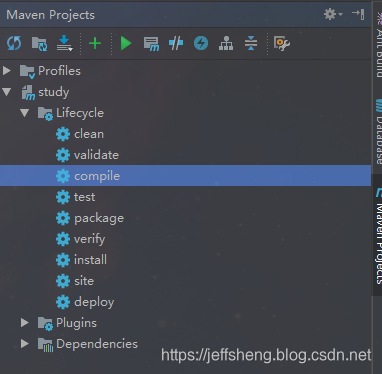谷歌开源的grpc以性能高效而著称,在追求高并发高性能的今天,将其应用到项目中去显得十分必要,这里github已经有相关资源:https://github.com/grpc/grpc-java
本文将举例作为抛砖引玉,实现一个简单的sayHello调用的demo。
加入grpc编译插件、依赖包
<build>
<extensions>
<extension>
<groupId>kr.motd.maven</groupId>
<artifactId>os-maven-plugin</artifactId>
<version>1.6.2</version>
</extension>
</extensions>
<sourceDirectory>src</sourceDirectory>
<plugins>
<plugin>
<groupId>org.xolstice.maven.plugins</groupId>
<artifactId>protobuf-maven-plugin</artifactId>
<version>0.6.1</version>
<!--添加.proto文件的编译工具-->
<configuration>
<!--protoc工具通过.proto文件生成对应的java对应的类-->
<protocArtifact>com.google.protobuf:protoc:3.10.0:exe:${os.detected.classifier}</protocArtifact>
<!--这是生成grpc工具类存放的文件夹的名字-->
<pluginId>grpc-java</pluginId>
<!--protoc-gen-grpc-java工具通过.proto文件生成grpc工具类-->
<pluginArtifact>io.grpc:protoc-gen-grpc-java:1.25.0:exe:${os.detected.classifier}</pluginArtifact>
<!--要编译的.proto文件的路径-->
<protoSourceRoot>src/grpc/helloworld/proto</protoSourceRoot>
</configuration>
<executions>
<!--这是上面两个编译工具用到的命令-->
<execution>
<goals>
<goal>compile</goal>
<goal>compile-custom</goal>
</goals>
</execution>
</executions>
</plugin>
<plugin>
<groupId>org.apache.maven.plugins</groupId>
<artifactId>maven-compiler-plugin</artifactId>
<version>3.3</version>
<configuration>
<source>1.8</source>
<target>1.8</target>
<encoding>UTF-8</encoding>
</configuration>
</plugin>
</plugins>
</build>
依赖包:
<dependency>
<groupId>io.grpc</groupId>
<artifactId>grpc-netty-shaded</artifactId>
<version>1.25.0</version>
</dependency>
<dependency>
<groupId>io.grpc</groupId>
<artifactId>grpc-protobuf</artifactId>
<version>1.25.0</version>
</dependency>
<dependency>
<groupId>io.grpc</groupId>
<artifactId>grpc-stub</artifactId>
<version>1.25.0</version>
</dependency>
编写proto文件
proto文件的语法规则可以参考:
https://developers.google.com/protocol-buffers/docs/proto3

在src下建立package:grpc.helloworld.proto,创建一个Proto文件HelloMsg.proto。
syntax = "proto3";//指定版本为proto3,默认为proto2
option java_package = "grpc.helloword";//生成的java文件的包名
option java_multiple_files = true;
option java_outer_classname = "HelloWolrd";//编译proto文件会生成一个对应的描述文件,这里是文件名
option objc_class_prefix = "HLW";
//相当于服务的命名空间比如这里service_name是:jeffsmile.Greeter
package jeffsmile;
// The greeting service definition.
service Greeter {
// Sends a greeting
rpc SayHello (HelloRequest) returns (HelloReply) {}
}
// The request message containing the user's name.
message HelloRequest {
string name = 1;
}
// The response message containing the greetings
message HelloReply {
string message = 1;
}
使用maven的grpc插件编译proto

编译后会在target下生成一系列的java文件如图所示:

拷贝文件
在src下创建grpc.helloworld.generate用来存放刚生成的那些文件。

编写client和server端程序
服务端:
/*
* Copyright 2015 The gRPC Authors
*
* Licensed under the Apache License, Version 2.0 (the "License");
* you may not use this file except in compliance with the License.
* You may obtain a copy of the License at
*
* http://www.apache.org/licenses/LICENSE-2.0
*
* Unless required by applicable law or agreed to in writing, software
* distributed under the License is distributed on an "AS IS" BASIS,
* WITHOUT WARRANTIES OR CONDITIONS OF ANY KIND, either express or implied.
* See the License for the specific language governing permissions and
* limitations under the License.
*/
package grpc.helloworld;
import grpc.helloworld.generate.GreeterGrpc;
import grpc.helloworld.generate.HelloReply;
import grpc.helloworld.generate.HelloRequest;
import io.grpc.Server;
import io.grpc.ServerBuilder;
import io.grpc.stub.StreamObserver;
import java.io.IOException;
import java.util.logging.Logger;
/**
* Server that manages startup/shutdown of a {@code Greeter} server.
*/
public class HelloWorldServer {
private static final Logger logger = Logger.getLogger(HelloWorldServer.class.getName());
private Server server;
private void start() throws IOException {
/* The port on which the server should run */
int port = 50052;
server = ServerBuilder.forPort(port)
.addService(new GreeterImpl())
.build()
.start();
logger.info("Server started, listening on " + port);
Runtime.getRuntime().addShutdownHook(new Thread() {
@Override
public void run() {
// Use stderr here since the logger may have been reset by its JVM shutdown hook.
System.err.println("*** shutting down gRPC server since JVM is shutting down");
HelloWorldServer.this.stop();
System.err.println("*** server shut down");
}
});
}
private void stop() {
if (server != null) {
server.shutdown();
}
}
/**
* Await termination on the main thread since the grpc library uses daemon threads.
*/
private void blockUntilShutdown() throws InterruptedException {
if (server != null) {
server.awaitTermination();
}
}
/**
* Main launches the server from the command line.
*/
public static void main(String[] args) throws IOException, InterruptedException {
final HelloWorldServer server = new HelloWorldServer();
server.start();
server.blockUntilShutdown();
}
static class GreeterImpl extends GreeterGrpc.GreeterImplBase {
public void sayHello(HelloRequest req, StreamObserver<HelloReply> responseObserver) {
HelloReply reply = HelloReply.newBuilder().setMessage("Hello " + req.getName()).build();
responseObserver.onNext(reply);
responseObserver.onCompleted();
}
}
}
客户端:
/*
* Copyright 2015 The gRPC Authors
*
* Licensed under the Apache License, Version 2.0 (the "License");
* you may not use this file except in compliance with the License.
* You may obtain a copy of the License at
*
* http://www.apache.org/licenses/LICENSE-2.0
*
* Unless required by applicable law or agreed to in writing, software
* distributed under the License is distributed on an "AS IS" BASIS,
* WITHOUT WARRANTIES OR CONDITIONS OF ANY KIND, either express or implied.
* See the License for the specific language governing permissions and
* limitations under the License.
*/
package grpc.helloworld;
import grpc.helloworld.generate.GreeterGrpc;
import grpc.helloworld.generate.HelloReply;
import grpc.helloworld.generate.HelloRequest;
import io.grpc.ManagedChannel;
import io.grpc.ManagedChannelBuilder;
import io.grpc.StatusRuntimeException;
import java.util.concurrent.TimeUnit;
import java.util.logging.Level;
import java.util.logging.Logger;
/**
* A simple client that requests a greeting from the {@link HelloWorldServer}.
*/
public class HelloWorldClient {
private static final Logger logger = Logger.getLogger(HelloWorldClient.class.getName());
private final ManagedChannel channel;
private final GreeterGrpc.GreeterBlockingStub blockingStub;
/** Construct client connecting to HelloWorld server at {@code host:port}. */
public HelloWorldClient(String host, int port) {
this(ManagedChannelBuilder.forAddress(host, port)
// Channels are secure by default (via SSL/TLS). For the example we disable TLS to avoid
// needing certificates.
.usePlaintext()
.build());
}
/** Construct client for accessing HelloWorld server using the existing channel. */
HelloWorldClient(ManagedChannel channel) {
this.channel = channel;
blockingStub = GreeterGrpc.newBlockingStub(channel);
}
public void shutdown() throws InterruptedException {
channel.shutdown().awaitTermination(5, TimeUnit.SECONDS);
}
/** Say hello to server. */
public void greet(String name) {
logger.info("Will try to greet " + name + " ...");
HelloRequest request = HelloRequest.newBuilder().setName(name).build();
HelloReply response;
try {
response = blockingStub.sayHello(request);
} catch (StatusRuntimeException e) {
logger.log(Level.WARNING, "RPC failed: {0}", e.getStatus());
return;
}
logger.info("Greeting: " + response.getMessage());
}
/**
* Greet server. If provided, the first element of {@code args} is the name to use in the
* greeting.
*/
public static void main(String[] args) throws Exception {
// Access a service running on the local machine on port 50051
HelloWorldClient client = new HelloWorldClient("localhost", 50052);
try {
String user = "jeffSmile";
// Use the arg as the name to greet if provided
if (args.length > 0) {
user = args[0];
}
client.greet(user);
} finally {
client.shutdown();
}
}
}
启动服务端测试
启动服务端监听50052端口,然后使用客户端进行测试:

客户端打印:

总结
其实重点就是编写好proto文件,定义好grpc的访问路径、方法名、请求参数、响应参数,生成一系列的grpc文件,比如请求类、响应类、grpc类等。
到这里,案例已经结束,欢迎留言一起交流!
